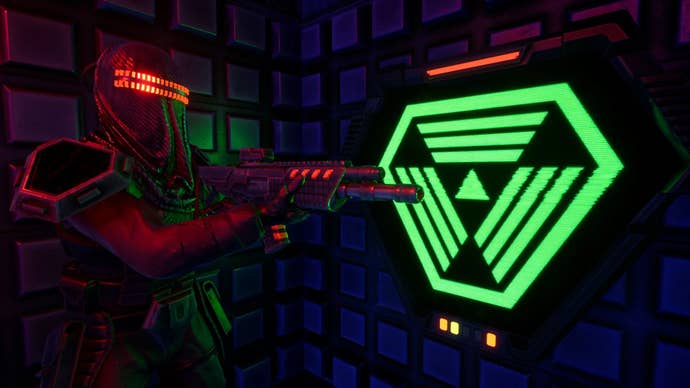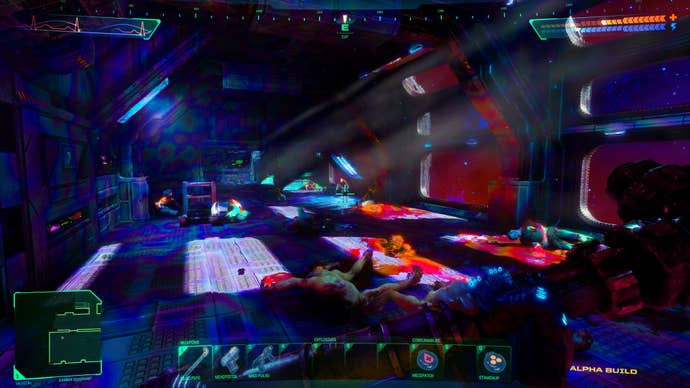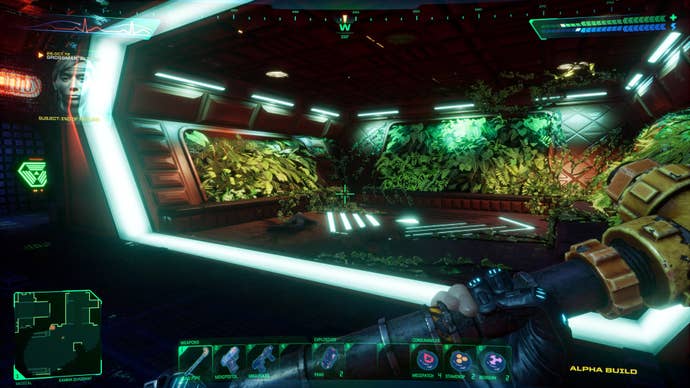[ad_1]
If you’ve been poking your head around the horror space for the past decade, chances are you’ve heard something about the System Shock remake. It’s been through a long bumpy ride, via Kickstarter, a full development reset, and Covid-19 delays. After all these hurdles, Shodan is back and by all accounts taking the horror genre by storm right now.
What an exciting and downright hilarious time for an AI-themed remake of a horror classic to come out. Not only are we at a time when Capcom and Konami are bringing out classics rebuilt from the ground up with fresh coats of paint, but the indie horror development scene has never been stronger thanks to modern classics like Signalis championing the genre. . Then there’s the particular irony of System Shock returning at a time when AI has been so contentious among game developers.
Now that the game is out, I spoke with Nightdive CEO Stephen Kick and the studio’s director of business development Larry Kuperman, who broke down their thoughts on the game’s release, the state of horror, and the AI in the game. Game development.
“People say our game was delayed; actually, we paused and waited for the industry to catch up,” Kuperman quips when asked about the current trend toward horror remakes. Nightdive’s game had been announced and was in some stage of development long before any of the biggest horror hits at the moment were even conceived in an official capacity.
Kick continues on how this impacted his own journey with System Shock: “Personally, I’ve enjoyed the work Capcom has done on the Resident Evil revival. While System Shock has been in development, they’ve done 2, 3, and 4, now? They’re all touted as examples of how to remake classic games. It really helped guide our own vision for modernizing elements of classic games.”
Rather than view this situation as a bigger fish getting the remake worm before the folks at Nightdive could, Kick believes that the release and popularity of big horror remakes has “set up” the landscape for them. He goes on to comment on his thoughts on the popularity of the remakes, stating, “I think the reason they’re so popular is because there’s already an established fanbase that knows what it is, you don’t have to sell it to them again. Just from personal experience. I think I have Resident Evil 4 on six different platforms, you know?”

Kuperman chimes in after Kick, commenting, “We’re in a golden age where many, not all, but many, of the classic game developers are still with us and can provide guidance and oversight. We’re very grateful to Paul Neurath and Warren Spector on Otherside for his input”.
We are also apparently in a golden age of AI, or at least that kind of technology is being reproduced more and more these days than ever before. After a bit of drama earlier this year when the editor of the System Shock remake Prime Matter released a statement pledging its interest in AI, both Nightdive and Stephen Kick spoke with an opposite opinion. When asked if they would have chosen to use AI in the development of System Shock if given the chance, Kuperman responded with the following:
“It wasn’t an option, but it wasn’t a consideration either. Every aspect of the game, particularly with the art style, was intentional and deliberate. We wanted to do something with a modern look, but also clearly paid homage to the original style. That’s something we only our human artists (laughs), our meat sack artists, were able to come up with.” Kuperman made sure to emphasize deliberate as a keyword beforehand.
He continues: “But that’s fun. It’s not like we postponed the release of System Shock hoping the AI would become controversial and relevant. Yet here we are!”

“I think the main problem was with the messages,” Kick states, referring to the aforementioned situation with the Prime Matter post, “when we used Shodan’s Midjourney image. I mean, she’s an evil AI and the general idea it’s that she went off the rails and became conscious. You look at where we are now and it’s easy to draw a line. Google has already had to pull the plug on certain AI due to its fears that it would become self-aware.”
Kick concludes: “As far as using AI for game development, I think there will be a place for it, but it can never really replace the human side of things. If it’s used as a tool, then there could be a good balance.”
Since the journey to release was so long, I wanted to conclude by asking if the full list of developers past and present received credit for their work on System Shock. The length of time System Shock has taken to release means, of course, that the credits are substantial. Beyond the current team, the original development team from 1994 is credited, as are those who created the original Unity prototype used in the game’s Kickstarter campaign.
Interestingly, those who worked on the game between the Unity demo and the current team have not been credited. Kick justifies this decision by stating that his contributions “are not something that you will be able to experience”, while Kuperman adds that this was not done with malice and that “you were brought in to redo the work that I had done”. will not be used, your name must be accredited. Crediting both would create confusion.”

This is an interesting stance to take. The version of the game that the uncredited team worked on was removed, and development was later restarted on something “more true to the original” (thanks pcgamesn). With that being said, these folks got the job done, even if we didn’t actually get to see it. It is not the fault of the staff on that team that the project was restarted. If you’re a chef creating a menu for a new restaurant, aren’t the dishes you don’t use at the end still part of the journey to the finished product?
If you want to try System Shock for yourself, you can download the game now for PC.
[ad_2]